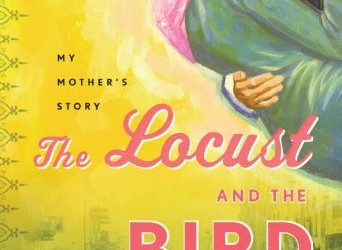Moroccan novelist Mohammed Berrada’s Lu’bat al Nisyan (The Game of Forgetting, 1987) begins with “In the Beginning was the Mother.” The main character in the novel, Hadi, is a leftist journalist suffering from a midlife crisis, disillusioned on the communal level by the deteriorating political situation in Morocco, and devastated on a personal level by the death of his mother, Lala Lghalya. Hadi’s mother is referred to as “indispensable, like salt in food” and represented in terms that depict her as a repository of memory, ”the roots of a tree extending far beyond this old house, which is firmly implanted in our of the alleys deep in the heart of Fez”. There’s a lot of this going on throughout the novel:
“She has always been like a root striking deep in the depths of the earth …Her existence precedes and extends…It is like a yearning for one’s homeland, like longing for the soil of one’s birthplace.”
Towards the end of the novel, Hadi wonders, “Is memory victorious over the game of forgetting? We water a dying tree, unsure if it will live, and despite that we can do nothing but water it in hope that its branches will unfurl with green.” Through the symbol of the tree, the novel returns as it began with the mother/the origin. It ends in an impassioned address to her: “We want you to stay with us. You won’t escape this time, we won’t lose you. We will draw from you patience and determination to remain.”
Hadi’s form of remembering the mother is of course a widespread trope in nationalist and nostalgic literature. Mona Fayed has examined this idea of the woman as representing an authentic connection to the land within the twentieth-century Arab literary tradition; she argues that “Woman as historical metaphor is most commonly represented through the allegory of mother/earth/country…al-umma, abstract feminization of al-umm, the mother.”
Fayed links her analysis of the representation of women in Arab literature to what many critics have seen as the problematic nature of nationalist discourse, which often appropriates women or the working class as signifiers of traditionalism, reservoirs of a communal identity out of which the “imagined communities” of the nation can be constructed.
On the flip side, there is the rejection of the past (still symbolized by the mother), in literature that expresses national disillusionment and bitterness instead of nostalgia. In Muhammad Abu Samra’s novel, Al Rajul as-Sabiq (The Former Man 1995), the protagonist is a middle-aged Lebanese émigré who returns to visit his native Beirut. He returns to the neighborhood he grew up in, an impoverished slum ironically called Salim Musad, which suggests wellbeing and happiness. In this novel the mother is rejected, connected to a terrible legacy that “has come down to you over generations and centuries.” The son addresses his mother in terms that reveal that his rejection of his mother (both rare and shocking in Arabic literature) to be a rejection of the culture she embodies:
“I began to see you as old, not the oldness produced by the advancement of years and the ageing of the body but a pure abstract kind of oldness, the oldness that lives in the nature of persons…persons as old as fashions and objects being used at a time and a world not their own.”
For the protagonist, the mother is the symbol of an aging impoverished culture that is out of place in the contemporary world. Against this image, the protagonist remembers that as a child he wished for a different mother, a modern mother with short hair who symbolized another cultural image which ultimately he has to give up on.
Increasingly over the years, writers such as the Egyptian Nawal al-Saadawi, the Palestinian Sahar Khalifeh, and the Lebanese Ghada al-Samman and Hanan al-Shaykh have challenged these clichéd representations, which reduce the role of women to national allegories and repositories of memory, whether the connotation is positive and nostalgic or bitter and disillusioned.

Cover of Hanan al-Shaykh’s The Locust and the Bird. [Source].
Hanan al-Shaykh, in her book about her own mother, The Locust and the Bird: My Mother’s Story, puts it like this: “I feel as if [my mother’s] life and essence mock Western stereotypes that obscure, much like the actual veil itself, the face of many an Arab woman.” While some might take issue with her views on the veil as effacing women, or argue that the Western stereotypes are sometimes based on realities, there is a clear attempt in her retelling the story of her mother to convey the life of a strong-willed individual, and to achieve a balance between understanding her mother as a victim and as a role model, which is something she talked about in a presentation at 5×15.
However, perhaps the novelist who has done most to engage both with the issue of women’s rights and with the political paralysis in the region is Sahar Khalifeh, who has explored the dialectic connection between the issues of nationality and gender while refusing to sacrifice one for the other. Her novels are preoccupied with exploring the issue of Palestine but without ignoring womens’ rights, which is a primary theme in all her novels, and especially in texts like Lam N’aud Jawari Lakum (We are Not Your Slaves Any More) and Muthakkirat Imra’ah Ghair Wki’iyyah (Memoirs of an Unrealistic Woman).
It is clear that for Khalifeh, the allegorization of women as representative of the land or the past is both injurious and insulting. As one of her women characters puts it with characteristic vehemence in the novel Bab as-Saha (1990), explicitly rejecting the reductionism in the idea of “the motherland”:
“I’m not the mother or the land or the symbol. I am a person, I eat, drink, dream, make mistakes, get lost, get agitated, suffer, and talk to the wind. I’m not a symbol, I’m a woman.”

